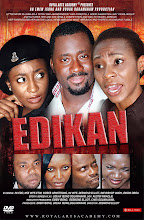
I am privileged to work in both industries. Yesterday I chatted with Eghosa Imasuen, a friend for whom my respect grows daily. His first book, ‘To Saint Patrick’ is a fantastic read. Unfortunately the book has sold very few copies. When he tells me how many copies have sold, I cringe. It is less than the number of copies ‘Reloaded’ sold in a day and ‘Jenifa’ perhaps in an hour. And so my question is why are Nigerian films selling so much and books not at all? Getting published in Nigeria particularly for new writers is almost as hard as crossing the ocean on foot.
In a brilliant interview by Eghosa here, he insists that Nigerians read. I share the same sentiments. Inspirational books, Business books, Novels, just name it, Nigerians are reading it, ask the boys at Yaba, how many Sheldon’s or Archers they sell in a day or stop by Laterna and watch the crowd. I think it’s been a very wrong notion that Nigerians do not read, unfortunately we have come to believe this, even the publishers which is why I think the books are not selling. The people behind it consciously or subconsciously don’ t really think that it will sell. They have created hurdles in their minds that don’t really exist. I also think they don’t see it as a business, perhaps they consider it charity. The marketing of books in Nigeria is terribly poor, I doubt that more than one percent of Nigerians are aware when a new book is released. All praises to Facebook. Farafina seems to have been waiting for the social network as that’s what they mostly rely on now. Take the 9writers tour, I have not heard it announced once on radio, nor seen it on TV nor read it on print, it is only online. While the online audience is huge, this is Nigeria, we do not have power supply, I personally have not had electricity in a week so how are we expected to access the net?
When one of Adichie’s books was released in England I happened to be in London and saw the posters in lots of places, train stations, buses etc. ‘Half of a yellow sun’ is recorded to have sold 40,000 copies in the U.K. alone. Farafina releases a book, sends the information to a few people on facebook and then waits for a miracle. It sounds to me like a crazy plan. I know that lack of funds may be a major factor but in business, you have to spend money to make money. Which is why I doff my hat for Nollywood guys particularly the Idumota guys who practically made Nollywood, They pumped their money in, pushed the movies out there and now several people are reaping the benefits. Several of my writer friends are trying to cross over because while our first love may have been prose or poetry, nobody wants to write a book that nobody’s going to read. Personally, I prefer to write screen plays because there I can be anything I want to be,I can choose to write about love, beauty, religion, anything at all but when writing literature I must remain guarded, I am forced often to write to type, in style, in language, in everything, constantly glancing over my shoulders to be sure that my (western) audience is following. Nollywood has set me free but I want books to do the same.
The publishers should repackage not just the books but the presentation of the books to the public, Nigerian writers and readers have been made to believe that our books must run social commentary or be historic to succeed particularly after the success of Adichie’s half of a yellow sun. While that is a good thing, it can get tiring and boring. Our novels are presented like academic books, the readings are so boring you wonder why you would spend 2 hours of your hard earned time getting bored. A book is a product like any other, it has to be well packaged, advertised and made available to the public.
It’s very embarrassing to hear about the poor sales of books particularly when one knows that it can do so much better. If we could read pacesetters, African writers series, I don’t see why we can’t read any other one that is made available.


